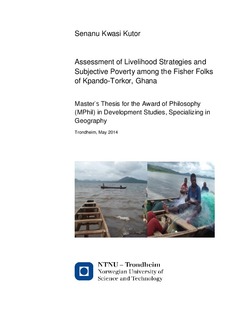Assessment of livelihood strategies and subjective poverty among the fisher folks of Kpando-Torkor, Ghana
Master thesis
Permanent lenke
http://hdl.handle.net/11250/2448410Utgivelsesdato
2014Metadata
Vis full innførselSamlinger
- Institutt for geografi [1023]
Sammendrag
The thesis is about the assessment of livelihood strategies and subjective poverty analysis among the Fisher Folks of Kpando-Torkor, Ghana. The specific objectives were to investigate the multidimensionality of poverty among the fisher folks in Kpando-Torkor from subjective perspective, to identify the emerging livelihood pathways in the study area apart from fishing and how are such activities perceived by the fisher folks, to identify the challenges facing the fisher folks and to examine means of assessing information regarding fishing among the fisher folks within the context of SLF.
Mixed mode method of data collection was used in this study. For this study, information was collected using survey, semi structured interview, observation and secondary data. An interview guide was used to encompass the qualitative dimension aspect of it whilst questionnaires were administered taking care of the qualitative aspect. Informants were selected through purposive sampling. Primary data was collected through 80 administered questionnaires and 10 semi structured interviews among the fisher folks of Kpando-Torkor.
Findings revealed that half of the fisher folks of Kpando Torkor perceived themselves as well off whilst the remaining halve perceived themselves as poor. All subjective indicators of food, water, income, housing and health used in this study buttress the poverty status of the fisher folks. Tree planting and Zoil was identified as the emerging livelihood strategies in the area but majority of respondents admitted that the sustainability of the emerging livelihood is not good since the economic prospect is minute as compared to fishing activities. The respondents identified the central government, the local government, close relatives and others (financial institutions, banks, NGOs, Civil Society) as actors responsible to address the challenges they are confronted with in pursuit of their livelihood due to the structure and processes in place.
